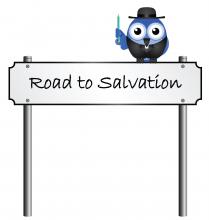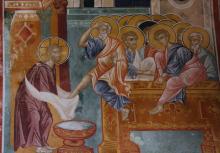disciples

AMID RESISTANCE AND the fight for liberation, we must be humble, seek God’s mercy and love, and be willing to learn from one another. We cannot go around virtue signaling while believing we have no shortcomings.
This month’s reflections focus on repentance. I seek to confess and repent. Not with false humility or performative self-deprecation, but to be genuinely self-critical as I examine my conscience. The passages from Jeremiah and the psalms tremendously help with reorienting ourselves and our moral compass toward God. The New Testament readings strengthen us to continue doing the godly and righteous work of the Spirit. Luke reminds us that following Christ is challenging and that we are often lost due to our sins. The writer of 1 Timothy extends an invitation to repent.
We are continuously called to heal the wounds of our neighbors (and ourselves). Economic injustice creates many wounds for the poor as well as the rich. Luke’s gospel challenges us to reorient our relationship with money and economic systems in radical ways. We have heard the aphorism “For the love of money is a root of all kinds of evil” (1 Timothy 6:10). Luke challenges us to go deeper, to revisit our relationship with material excess in ways that are not only uncomfortable, but also structurally disruptive. Please join me as we seek God’s guidance in our collective journey of repentance, resistance, and reconciliation.

This is not a time for the marketplace of ideas. There are people who believe that immigrant children are criminals. There are people who act as though queer folks are an abomination. There are people who consider every black and brown person to be a threat. These ideas are not worth debating. Logical conversations will not dissuade oppressors. Civility has never transformed the reality of the marginalized and it never will.

Power can be transformative, but only if power is suffused with love. As Andy Crouch has written, “Power at its worst is the unmaker of humanity—breeding inhumanity in the hearts of those who wield power, denying and denouncing the humanity of the ones who suffer under power.… Power, the truest servant of love, can also be its most implacable enemy.”

The resurrected Jesus is recognized not by his words but by his wounds, the wounds of his crucifixion. Herein lies a great irony. The crucifixion has left its indelible marks upon the resurrected one, such that the risen Jesus is recognizable only through them. On the one hand, resurrection has not erased his wounds. On the other hand, Jesus’ wounds no longer define him as a dead criminal, as determined by the state. Jesus doesn’t wince at Thomas’s touch. Even as his wounds remain, Jesus’ body is made whole and new.

In so many of the gospel stories that are familiar to us, women were behind the scenes — always there, always present, always faithful — but nearly always in the background and hardly ever mentioned by the men in the stories, and certainly not the ones writing the stories. Their testimony as women was not even admissible in court under Jewish law; the word of a woman had no public credibility in that patriarchal culture. But God chose to reveal the miracle of Jesus' resurrection first to women. They were then told to report the astonishing news of the empty tomb to the men.

The world seems to be witnessing increasing levels of violence, fear, and hatred that challenge us each day. There are ongoing debates about how or whether to welcome immigrants and refugees to the United States; news headlines remind us about the plight of Syria and about the horrors of the Islamic State.
In such times, talk about mercy may seem more like wishful thinking. But mercy matters – now more than ever.

Americans voted largely along the lines of race, education, and party identification. Nonwhites strongly preferred Clinton, while whites decisively chose Trump. Compared with past Republicans, the businessman received a stunning surge of votes from non-college-educated white voters.
None of this is surprising.
And yet the result upends so much conventional wisdom.

Martha was a disciple of Jesus, and she loved, supported, and hosted him for dinner, as friends do. Yet Martha, like all of us, sometimes became bogged down by the details of her hospitality, and as a result, lost sight of the presence of the God she was serving — the God who was literally right in front of her. In my own story I, too, failed to encounter God when God was right in front of me, present in my friends, distracted as I was by the details of my hospitality.

THE LECTIONARY PASSAGES for these weeks of Pentecost make the season come alive. Why? Because who doesn’t light up at receiving gifts? We humans are pretty good at giving gifts—Christmas, birthdays, graduations. Yet our giving pales in comparison to that of the Holy Spirit. Usually we give because we expect something in return. The Holy Spirit gives freely and abundantly out of unending love and grace. These scriptures tell of the Holy Spirit giving us all we will need to lead God’s people: happiness, tongues, humility, and boldness. And yet we’ll also get more than we need: The Holy Spirit both gives and empowers.
For the work ahead, we will certainly need a power that goes beyond ourselves—unless we are satisfied with half-baked sermons, timid leadership, and time-bound visions. In case this sounds like your grandmother’s preacher on the “fruits of the spirit,” remember that the Spirit put on display in these verses is the prophetic, justice-loving, reconciliation-seeking third person of the Trinity who anointed Jesus with his mission. His was a mission “to bring good news to the poor ... to proclaim release to the captives and recovery of sight to the blind, to let the oppressed go free, to proclaim the year of the Lord’s favor” (Luke 4:18b-19). What a politically theological imagination, capable of transforming the world! It’s the same one the Holy Spirit gives to us today through the church for the world. That’s a gift worth dying for. Holy Spirit come, come quickly!

I have never really understood personal evangelism. Maybe it’s because I have never really been good at sharing my faith — at least not with complete strangers. I have never stood on the street corner preaching to all within earshot. I’m not the guy with numerous stories about how I shared my life story with the person sitting next to me on the plane, inducing a tearful admission that he needs Jesus. (I am not condemning these types of encounters, nor am I condemning these practices altogether.) To be completely honest, I don’t think I have even one story like that.
Recently, I have been trying to better understand the Great Commission. I have to tell you what I hear Jesus telling me in that particular passage. You might be surprised to find that he isn’t telling me to share the Gospel with all who will listen (although, that is part of it); rather he is telling me (and you) to go and make disciples. The former is really just words; the latter is words and actions, ultimately culminating in a relationship.

Editor's Note: This post was originally a sermon in our monthly Sojourners chapel.
Friends, grace and peace to you from God our Father and the Lord Jesus Christ.
Around the time I started middle school, my church acquired a series of books called The Left Behind Series. These books chronicle the final days of earth as outlined in the book of Revelation and other apocalyptic biblical texts. I won’t offer any commentary on the theology of these books, or even their literary value, but, as a middle-schooler, they were fairly impressionable.
The entire series begins with a dramatic reinterpretation of the rapture. People are going about their daily lives — driving to work, flying airplanes, making breakfast — when all of a sudden, people who had been there just seconds before are gone. Simply vanished into thin air. Of course, chaos ensues, because who is driving the car? Flying the airplane? Tending the stove? The world they leave behind is shattered, broken, and chaotic! This seminal event — the rapture — shapes the rest of the series as those who have been “left behind” work to win the ultimate prize — a place in heaven where they are no longer left behind.
IT CAME TO pass in the summer of ’72 that many young people gathered in Dallas for Explo, a week of training for Christian witness sponsored by Campus Crusade for Christ. ... And among those present in Dallas were some messengers of peace—some post-Americans calling themselves the People’s Christian Coalition, and a few sons of Menno sent by the Mennonite Central Committee, who had also come to witness for their Lord.
The messengers of peace set up their booths along with many others and distributed their literature. And many people came by. Some looked and smiled; some looked and frowned. Some said “right on” and “we need that” in response to posters saying “blessed are the peacemakers” and “swords into plowshares”; but others said “praise the Lord, God will take care of wars, all we need is to win people to Christ.”

Kind, tired eyes from too much seeing ...
Worn, battered shoes from too much walking ...
Stained, tattered shirt from too much working ...
Gentle, calloused hands from too much holding ...
Open, humbled heart from too much knowing ...

BELATED CONGRATULATIONS to Jesus Christ after recent research revealed that he might have been married during his short life. (Although, if he had to help with the dishes every night, it might have seemed longer.)
My immediate reaction was to wonder what you get a deity for a wedding present, even though it’s way too late. Their Pottery Barn listing is probably out of date, but that might be for the best, since all the cheap stuff would have been taken by now. (My oldest daughter is getting married next year, so I speak from experience that you’ve got to get in there fast and sign up for that salt shaker. Otherwise, you’re stuck buying an entire set of towels, or a food processor. She’s my daughter, but one must draw the line.)
Trying to get your head around the idea that the shortest verse in the Bible should be “Jesus wed,” the whole thing seems a little farfetched, but you can’t argue with possible science. Harvard Divinity School professor Karen L. King claims that a 4th-century papyrus fragment, written in the Coptic language of Egyptian Christians at the time, makes a reference to Jesus’ “wife.” King presented her findings at a recent gathering of the International Congress of Coptic Studies, which doesn’t seem like the kind of gathering that generates much Twitter traffic, unless there’s a private party in one of the rooms. (“Would you like to come upstairs and see my papyrus fragments?”)
From what I can tell by the photos, the handwriting on the fragment looks like a shopping list I’d hurriedly written out and then couldn’t read when I got to the store. Not having the foresight to bring along a Coptic translator, I’d invariably forget that one thing the family really needs. I wonder if Jesus had to put up with the same condescending looks when he brought home the wrong stuff. Okay, probably not.

Years ago on a bright Tuesday in March, I was driving to seminary and I found myself stuck in traffic on I-25. Sitting in a dead stop on the interstate I stared up into the clear blue Colorado sky and thought, “What in the world am I doing? I don’t believe a word of this Jesus stuff. I mean, It’s a fairy tale.”
But then in the very next moment I thought, “Except…throughout my life…I have experienced it to be true.”
I experience the gospel to be true even when I can’t believe it. And honestly sometimes I believe the gospel even when I don’t experience it. And I suggest to you today that this is why we have and even why we need Word and Sacrament. Because see, we are a forgetful people.
And it is to this office of Word and Sacrament that you have been called Matthew and I feel like in an ordination sermon, the preacher should in some way address the level of preparedness of the ordinand in question, and I am in a position to do just that.

This week I got an email from my friend Pastor Jodi Houge of The Humble Walk church in St Paul. Amy Hanson had emailed her asking if, when she’s at Luther, Amy could do her field ed placement at Humble Walk. So afterward when Jodi emailed me she said Oh my gosh thanks for sending Amy our way, I love her already. Jodi loves Amy Hanson already but not because of Amy Hanson’s winning personality, position or portfolio. Jodi Houge does not love Amy Hanson because Jodi’s so nice and has a big heart. Pastor Jodi loves Amy Hanson already based solely on the fact that Amy Hanson is loved by us. Based on the fact that Amy Hanson is our friend she will have an honored place at Humble Walk church in St Paul Minnesota.
In our Gospel text from today Jesus says to abide in his love, to love one another and then he calls his disciples friends. But the Bible tells us that he had other friends too. Mary, Martha and Lazarus of Bethany were Jesus’ friends. He like, totally hung out their house all the time – they stocked his favorite beer in the fridge. And when Lazarus died, Jesus stood at the tomb of his dead friend and wept. These were Jesus friends. And since at our Big Fat Church Meeting after liturgy today we are going to talk about things like sacred hospitality, I started to wonder what kind of hospitality 3 strangers who came to our church might receive if we found out that those 3 strangers were actually Mary Martha and Lazarus. If we knew that the people entering the doors of this, our little House for all Sinners and Saints, were actually Jesus’ friends, that they were those whom Jesus loved then despite what we thought of their personalities, despite how we felt about them or their status in society or their politics, despite any of this they would automatically have an honored place, right?
We would, as Jodi does Amy, already love them not based on how we felt about them, but we would love them with the love Jesus speaks of in our gospel text for today… which in Greek is called agape love.

The Gospel of St. Matthew, Chapter 28 tells us:
The angel spoke to the women: "There is nothing to fear here. I know you're looking for Jesus, the One they nailed to the cross. He is not here. He was raised, just as he said. Come and look at the place where he was placed.
"Now, get on your way quickly and tell his disciples, 'He is risen from the dead. He is going on ahead of you to Galilee. You will see him there.' That's the message."
To listen to a playlist of music for this Resurrection Day 2012, CLICK HERE.

Someone beloved to me is suffering from a horrific disease right now. If I could fight this disease with a sword all my pacifist tendencies would run screaming for the hills and I would take up that sword and I would fight. Just the thought raises a rage up within me that is passionately intense and I long for such a sword.
I can’t help but think that Jesus must have felt some of this, human as he was. Because of who he was and what he did the poor and the outcast and the sick were drawn to him and so he saw suffering every day. He healed and he taught and he called for others to follow him, yet the suffering still was all around. Some part of his humanity must have wanted to take up a sword and fight it. Yet he knew that violence was not the answer.
There was another way.
So instead of a sword, he took up... a towel and filled a basin with water.

As we walk with Jesus ever closer to Good Friday, we recognize today as Maundy Thursday, commemorating the day that Jesus celebrated his last Passover meal — the Last Supper — with his disciples and washed their feet. Later that night, he would go with them to the Garden of Gethsemane, to wrestled with his humanity and the mission God the Father had called him to — to suffer and die on the cross at Golgatha the next day. Jesus asks his disciples to stay awake with him, to keep him company and join him in prayer. But they fall asleep, leaving Jesus alone in his dark night of the soul.
This is my body ... broken for you.
We've compiled a playlist of songs inspired by or that speak in some way to the Holy Week journey that brings us to Maundy Thursday and the great mandate from which the day takes its name: "If I, the Master and Teacher, have washed your feet, you must now wash each other's feet."

Dear HFASS,
How are you? I am fine.
Actually that’s not true.
See, I wrote another sermon this week. A real one. I worked on it all week. And then yesterday afternoon I threw it away and just wrote you this letter instead. Because I realized that in my sermon I was trying really hard to convince you of something.